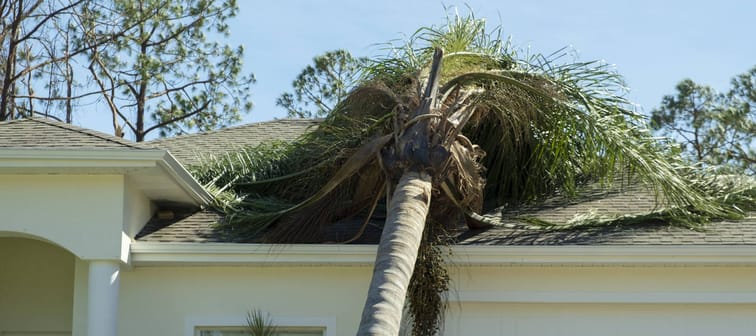Who's liable for damages?
Laws regarding liability are more clear in some states than others, but generally speaking, when a tree falls during a storm it’s considered an act of nature. And in many cases, it’s not your neighbor’s financial responsibility, even if it was their tree that fell from their property onto yours and caused damage.
However, there can be exceptions to this rule. If it can be proven that your neighbor knew about structural problems with the tree, or that it was dead or rotted, and they failed to do anything about it, then you may be able to pin them for damages.
For example, say you sent your neighbor a series of emails asking them to take down a dead tree that’s been teetering over your fence. If your neighbor’s response was an emphatic “no” each time, and you have that paper trail, you may be able to use it as evidence against them. But if a healthy tree falls onto your property, or even an unhealthy tree whose issues were unbeknownst to you and your neighbor, then you might be the one who’s going to have to deal with the damage.
Stop overpaying for home insurance
Home insurance is an essential expense – one that can often be pricey. You can lower your monthly recurring expenses by finding a more economical alternative for home insurance.
Officialhomeinsurance can help you do just that. Their online marketplace of vetted home insurance providers allows you to quickly shop around for rates from the country’s top insurance companies, and ensure you’re paying the lowest price possible for your home insurance.
Explore better ratesWhat to do when a neighbor's tree damages your property
If your property is damaged by a fallen tree, whether it originated from your property or a neighbor’s, your first move should be to contact your homeowners insurance company. From there, your insurer will generally assess the damage and have you file a claim.
Depending on the extent of the damage, you may want to consider whether or not it's worth it to file a claim. If there’s minimal damage, it may not pay to file a claim if the cost of repairs is below the cost of your deductible. But since tree damage can be extensive, in many cases, filing a claim does make sense.
If you have proof that your neighbor knew that their tree was a risk, that’s information you should provide to your insurance company. They can investigate and, if needed, go after your neighbor’s homeowners insurance to recoup the costs.
One thing you should know, though, is that if a neighbor’s tree falls on your property and damages your car, your homeowners insurance policy may not cover it. That’s often a claim you’ll have to submit to your auto insurer. If a neighbor’s tree causes damage to your home and car simultaneously, you may be looking at two separate claims.
It’s important to have emergency savings at all times in case things like this happen, because even with insurance picking up much of the tab, you risk certain out-of-pocket costs. It’s also a good idea to familiarize yourself with your insurance coverage so you know what to do when damage occurs.
This 2 minute move could knock $500/year off your car insurance in 2025
OfficialCarInsurance.com lets you compare quotes from trusted brands, such as Progressive, Allstate and GEICO to make sure you're getting the best deal.
You can switch to a more affordable auto insurance option in 2 minutes by providing some information about yourself and your vehicle and choosing from their tailor-made results. Find offers as low as $29 a month.







